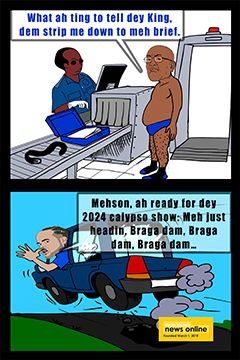Debt fueled growth: pros and cons!
Borrowing to generate economic growth post Irma is valid, prudent, and risky.
The vast growth of government in western society post the Second World War has also corresponded with a huge growth in government spending and government borrowing to maintain spending on both social and physical infrastructure.
Public debt greatly increases in the aftermath of crisis.
The US public debt figure increased after 9/II, in an effort to finance wars in Iraq and Afghanistan.
War in the Middle East increased the annual deficit to much more than what the US deficits were before the terrorists struck.
So too with natural disaster: the pacific Tsunamis that struck in December 2004 killing nearly 300,000 people was also a financial disaster and created a debt burden for the countries that suffered the devastation over many years.
This was spending to repair devastated infrastructure and rehabilitate communities and societies in a vast region.
Hurricanes Irma and Maria devastated islands in the Caribbean.
The Virgin Islands is estimated to have lost between 3-4 billion dollars from the impact of Hurricane Irma that basically destroyed the country.
The story is similar in Puerto Rico, The United States Virgin Islands, Dominica, Anguilla, and Barbuda.
Disasters, wars, and economic crisis, are triggers and generators of increasing public debt as governments finance reconstruction with borrowing.
The growth in public debt in the west has become a modus Vivendi: a way of life for governments and economic planners.
Debt financing is the norm. It is highly unusual for governments to spend from their cash reserves to maintain solvency, and national economic and social welfare.
America’s 21 Trillion Dollar national debt appears to be an eternal debt.
The problem with debt fuelled economic growth is that the debt incurs rates of interest.
These rates of interest are tantamount to further spending and further increase the annual deficit. When that debt becomes unsustainable because government cannot keep up with the interest payments, then a crisis may develop where investors flee and the country goes bankrupt and has to suffer the intervention of external agencies such as the International Monetary Fund and World Bank: the Greek Model.
There is an optimum debt level.
This is where public debt drives GDP and both foreign and national investment. Government spending hits the right note for investors who are more than willing to put their hard earned cash to work in the economy.
However, a dependency on annual deficits – borrowing- to generate economic growth and social prosperity can become a harmful culture.
Instead of government using its own capital and resourcefulness to spend on social and economic growth, government relies on borrowing and Foreign Direct Investment overwhelmingly, to govern.
A culture of credit and spend develops.
This is what leads to boom and bust economies: a dependency on credit to drive economic growth.
The main source for government revenue must be taxation and public revenues: not borrowing. However, increasingly, governments are depending on borrowing to govern. This is because investors see government as a safe place to put their cash.
The investor becomes the piggy bank for government.
Too much dependency on borrowing takes away the initiative of governments to look for alternative sources of revenue.
Encouraging innovation and enterprise takes a back seat. Borrowing becomes an easy route to drive economic growth.
Banks prefer to lend to government than private business. Private lending shrinks. National indebtedness can become endemic. This is not what the Virgin Islands needs. Borrowing should be a fall back. Borrowing should not become a culture.
It becomes too easy to depend on borrowing to finance government spending. That dependency becomes a culture that never ends.
Or it may just end in financial disaster as financial prudence takes a back seat and the debt and interest burden becomes unsustainable.
Connect with Dickson Igwe on Facebook and Twitter










.png)
.png)



.png)






















3 Responses to “Debt fueled growth: pros and cons!”
Undoubtedly, there is a great sense of urgency and need to rebuild. However, the government does not have the money to start the money to fully fund rebuilding effort; it has to incur debt. It has to incur debt that will temporarily exceed the recommended the prudent debt to GDP ratio of 40-60%. Generally, debt on things that appreciate in value is considered a good debt, ie, a home, national growth and development.......etc. As noted, the territory will have to borrow billions to rebuild. Consequently, it must get value for money. Many bloggers have been advocating for the territory to take a deliberate pause and do things differently than it had in the past. In the past, it lacked discipline, a strategic national development plan and didn’t get value for money. It shot from the hip, employing a ready-fire-aim approach, squandering an opportunity. Nevertheless, there is an opportunity now to plan the work and work the plan. Let’s go Team BVI. #BVI strong.